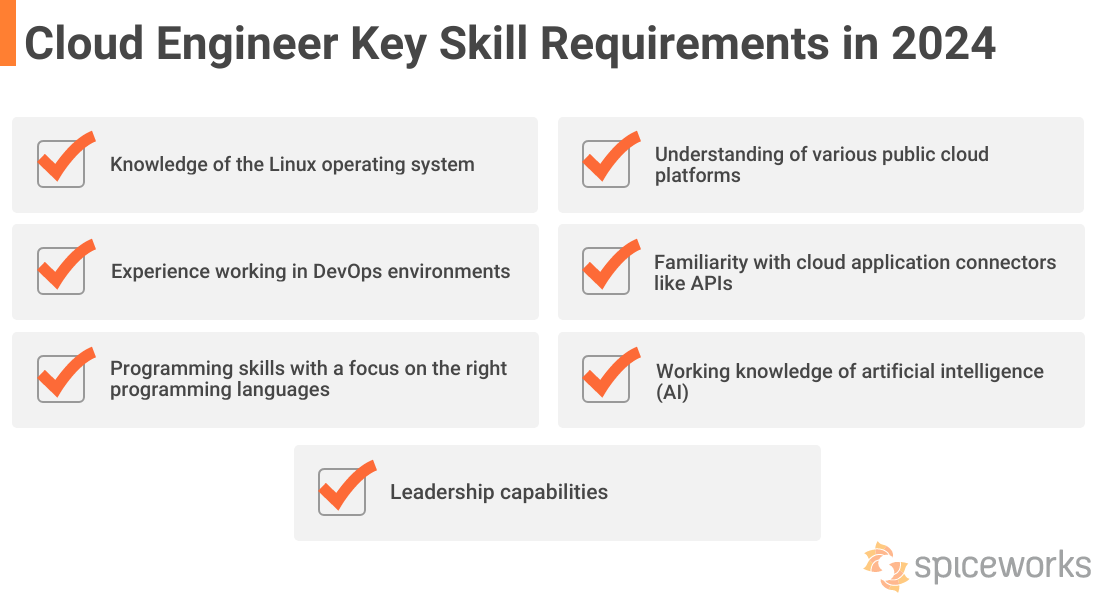Cloud Engineer: Role, Key Skills, and Salary in 2024 | Spiceworks

- A cloud engineer helps companies achieve success with cloud-based storage, services, and infrastructure by building, maintaining, provisioning, securing, and optimizing digital systems that operate using cloud technology.
- Cloud engineers play an important role in cloud adoption at enterprise tech companies as they use the cloud to ship new products. They help make the most of the available resources to ensure business success.
- This article explains the roles and responsibilities of cloud engineers, the skills needed to become one, and the salaries to expect in this career path.
Cloud Engineer Job Description: Roles and Responsibilities
A cloud engineer is a technical expert who helps companies succeed with cloud-based storage, services, and infrastructure by building, maintaining, provisioning, securing, and optimizing digital systems that operate using cloud technology.
The importance of the cloud engineer’s job role
Companies have increasingly moved away from on-premise systems and local installations. Instead, they adopt remote servers managed by a third-party provider, i.e., the cloud, and remotely hosted computing services.
According to a report by Grand View Research, the cloud computing market will reach $1,554 billion by the turn of 2030. This growth makes cloud engineering one of the most influential forces impacting the IT landscape across industries. That is why cloud engineers play such an important role for companies today. They help:
- Reduce business expenses: With on-premise infrastructure, scaling up needs more investments, including software licenses, hardware, networking supplies, and in-house experts. However, when organizations migrate to the cloud with the assistance of skilled cloud engineers, they can minimize the investment in legacy infrastructure.
- Use complete business intelligence: Cloud engineers allow organizations to use the most recent data analytics tools. They have to evaluate a vast array of data, like big data, and archive and apply the results for future analyses.
- Scale the business faster and more seamlessly: Cloud solutions can scale up or down rapidly depending on user needs. Being highly adaptable, the cloud doesn’t limit a business to a single location. However, companies need cloud engineers to navigate the growth journey.
- Increase enterprise resilience to interruptions and disasters: Cloud engineers might help a business get back on its feet after a natural disaster. Also, they can use cloud archives to safeguard private information from ransomware attacks.
- Build a culture of collaboration: Using the cloud, businesses can create a multiregional architecture that can be accessed from any part of the world despite location restrictions. Cloud engineers can help deploy next-gen collaboration systems that are user-friendly and accessible.
See More: AWS Cloud Practitioner: Certification, Exam, Jobs, and Salary in 2022
Key responsibilities of a cloud engineer
The exact duties of a cloud engineer can vary, depending on the company, its business, and the project. However, the responsibilities of a cloud engineer broadly include one or more of the following:
1. Assessing technology and preparing for cloud transformation
Cloud engineers evaluate an organization’s technology infrastructure and examine cloud migration options. If the company chooses to migrate to the cloud, a cloud engineer manages the migration process and looks after the new system.
In conjunction with these technical abilities, cloud engineering necessitates managerial skills. Engineers are frequently required to interact with vendors, consult with other IT collaborators, and brief senior management on the status of cloud migration projects.
2. Optimizing the architecture before, during, or after cloud migrations
The role will additionally focus on cloud infrastructure configuration.
Multiple IT, networking, and security features must all be arranged appropriately within a cloud environment. Configuration performs two crucial functions. First, it grants users access to the right resources based on their roles. Second, the business does not incur unanticipated or unnecessary costs because of cloud resource usage.
Contracts for cloud services may be as straightforward as renting hardware for data storage or as abstracted as charging for implementing a function inside a single line of code. This variance demands that cloud engineers pay careful attention to the contract’s fine print.
One of their primary duties is to assess how the organization will use a cloud service and the returns on investment (ROI) from the same.
3. Developing systems for the cloud
A cloud engineer can design cloud-based functions, apps, or databases. Most of the best practices, including quick loading times, compatibility with multiple internet browsers, and using as little memory as possible, are comparable to more conventional software and database development.
Now, however, these individuals need to know the cloud environment, its tools, and how working in the cloud differs from working with a single machine or in a private data center. For instance, cloud architects need to understand how an app will react when browsing databases in multiple locations. When renting hardware, they must be able to execute functions and searches successfully. This is part of their responsibilities.
See More: Cloud Native Network Function (CNF) Architecture Explained
4. Looking after cloud governance
A cloud engineer works exactly like a conventional system admin who manages an organization’s on-premise software and hardware components. The key difference is the fact that a cloud engineer prioritizes cloud-based services.
Their tasks include the creation and implementation of cloud service usage policies. They will also assist in the management of proposals for new technologies and in the creation of a safe cloud platform. In some organizations, cloud engineers are responsible for assuring service availability, also known as uptime.
When designing systems, safety and accessibility must be carefully considered. Most public cloud platforms employ a “shared model” in which they assure some security measures but not all. For instance, the client organization can be responsible for creating a firewall surrounding the network that accesses cloud services. It is the cloud engineer’s job to be aware of and enforce these requirements.
5. Operating databases on the cloud
Cloud engineers may be accountable for designing, implementing, and configuring databases. Also included are database maintenance (including updates and debugging), relocation, security, and developer support. As cloud computing evolves, these positions can include additional responsibilities and key performance indicators. For instance, the efficacy of cloud engineers can be measured by data recovery, privacy, and access speed.
Databases are essential to the operation of any cloud-based enterprise. As a result, the significance of this aspect of the cloud engineer’s responsibilities is increasing. Databases monitor and communicate sales, transactions, inventory, customer relationship management (CRM), and marketing information. The role of the cloud engineer is to build a framework that monitors, arranges, and uses this data.
6. Implementing measures for cloud security
Cloud-based systems contain vast quantities of data, making security an absolute essential. Cloud engineers must create and execute security strategies independently and in collaboration with cloud vendors. Also, they must monitor systems for potential risks.
In highly regulated industries like healthcare or government, the company’s cloud system must incorporate industry-specific safety protocols. Cloud-based data is more susceptible to breaches, hacking, and other attacks. Cloud engineers must install and manage security solutions and prevent unlawful use, alteration, or removal of valuable data.
The cloud security function may be separate in large companies. However, cloud engineers must still work closely with the security team to ensure secure development and operations on remote systems.
7. Managing and optimizing the use of cloud resources
A cloud engineer must understand how cloud resources work compared to conventional computing environments.
Most costs are fixed when a business employs on-premise servers to run apps and store data. However, cloud platforms are significantly more flexible because another entity, typically a multinational tech giant such as Amazon, Google, or Microsoft, invests in the necessary resources.
As a result of how cloud platforms bill for their resources, this flexibility leads to complexities. For some services, for instance, a business must decide whether it is logical to incur an hourly rate (for on-demand use) or a yearly fee (for continuous use). Inefficient cloud usage can also result in unexpected downtime or poor performance.
Cloud engineers are responsible for optimizing the use of cloud resources to help the company balance performance with costs.
In addition to these seven key responsibilities, a cloud engineer may be called to:
- Collaborate with stakeholders to learn about the changes they wish to make to their cloud-based systems.
- Upload data to a cloud computing platform and set up simple data retrieval mechanisms.
- Stay abreast of cloud computing innovations to guide companies and customers on industry best practices.
- Boost cloud storage capacity for storing additional files and vital business data.
- Analyze issues associated with cloud application malfunctioning or security vulnerabilities.
- Leverage robotic process automation (RPA) to improve the effectiveness and pace of specific cloud-based processes.
- Examine cloud architecture blueprints to identify flaws and make system enhancements.
See More: AWS Certifications: Path, Exams, and Cost in 2022
Cloud Engineer Key Skill Requirements in 2024
To succeed as a cloud engineer, one needs the following capabilities and skillsets:

Cloud Engineer Key Skill Requirements
1. Knowledge of the Linux operating system
The first and most important step is proficiency with the Linux operating system. As Linux is typically used to build infrastructure or administer configuration, working in this operating system would benefit cloud engineers. Virtual desktop installation in a cloud setting can be an important skill. Installing various software, evaluating performing load, downloading packages, and altering them are instances of complex commands.
2. Experience working in DevOps environments
The DevOps framework combines both operations and development and is frequently used in partnership with cloud infrastructure. Recently, services such as AWS DevOps and Azure DevOps have led to higher demand for this set of skills. Containerization is another DevOps skill to acquire, as it facilitates deploying applications on remote systems. Mastering Docker or Kubernetes makes for adept cloud engineers.
3. Programming skills with a focus on the right programming languages
Cloud engineers with programming skills can develop, use, and oversee new applications. Expertise in several programming languages is critical to work in tech companies. Structured query language (SQL) is useful for data operations, whereas Python is suitable for managing significant quantities of data. Golang and PHP are also prominent programming languages among cloud engineers.
4. Understanding of various public cloud platforms
Google, Microsoft, and Amazon Web Services, among others, offer cloud technologies to both consumers and companies. Cloud engineers should familiarize themselves with various platforms and get certified. Organizations may favor candidates with previous experience working for various service providers to provide less training. Also, diverse experience could indicate innovativeness for the new organization.
See More: AWS vs. Azure: Understanding the Key Differences
5. Excellent communication skills
Besides several valuable technical skills, cloud engineers must possess interpersonal skills to advance in their careers. They must convey ideas to stakeholders who may be unfamiliar with the technical terminology, so communication is crucial. Cloud engineers with excellent interpersonal abilities will also give troubleshooting solutions. They will find it simpler to work with other engineers on large projects.
6. Familiarity with cloud application connectors like APIs
One of the key benefits of cloud computing is that it offers almost infinite flexibility in connecting apps and workflows. Understanding web services and application programming interfaces (APIs) can be very helpful when combining applications over pooled cloud assets. Typically, open standards, including XML, WSDL, SOAP, and UDDI, are employed to identify, share, and interpret data. APIs are applications that facilitate the functioning and upkeep of the integration.
7. A working knowledge of artificial intelligence (AI)
Cloud engineers must have at least elementary knowledge of machine learning and AI. Currently, the most popular public cloud platforms offer AI and machine learning solutions in some capacity. Companies are eager to use the cloud to build AI apps and services.
8. Leadership capabilities
Engineers in the cloud may also arrange, assign, and direct processes within the technical teams they manage. They frequently instruct junior technicians and engineers and act as mentors for newcomers to the field. Cloud engineers must cultivate leadership skills, such as delegating duties, self-determination, and conflict resolution. This will help mobilize teams and inspire cloud innovation.
Cloud Engineer Salary in 2024
As per Glassdoor data last updated on 28 Aug 2023, the average salary of cloud engineers in the U.S. is $141,977. Expectedly, it is among the best-paying technical roles in the country, although salaries can vary depending on your exact title. For example, a cloud computing expert will earn $85,145 per year on average, while a cloud architect brings in $137,222.
Some of the best-paying companies in this field include Cisco, Oracle, IBM, Rackspace, and Amazon. Interestingly, cloud engineer job opportunities are spread across diverse industries like healthcare, government intelligence, consultancy services, and much more. All of these companies pay upwards of $130,000 for cloud engineering roles.
After a few years of experience as a cloud engineer, the next step is to become a member of the cloud engineering senior staff. Salaries in this role can go up to $164,342, making it worth the investment in gaining experience, skill sets, and certifications over the years. Additionally, one can expect cash compensation between $20,000 and $60,000 as bonuses, commissions, etc.
See More: Google Cloud Certification: Path, Preparation, and Salary in 2022
Takeaway
The role of a cloud engineer is crucial in a tech-driven world. As companies migrate to the cloud, these experts play a vital role in achieving success with cloud-based storage, services, and infrastructure.
Cloud engineers help reduce expenses by minimizing investments in legacy infrastructure and enable organizations to leverage complete business intelligence through data analytics tools. They also facilitate quick and seamless scaling of businesses, enhance resilience to interruptions and disasters, and promote collaboration through user-friendly systems. With the growing cloud computing market, cloud engineers are indispensable in guiding businesses through digital transformation.
Did we help you on your career trajectory as a cloud engineer? Tell us on Facebook, X, and LinkedIn. We’d love to hear from you!
Image source: Shutterstock



